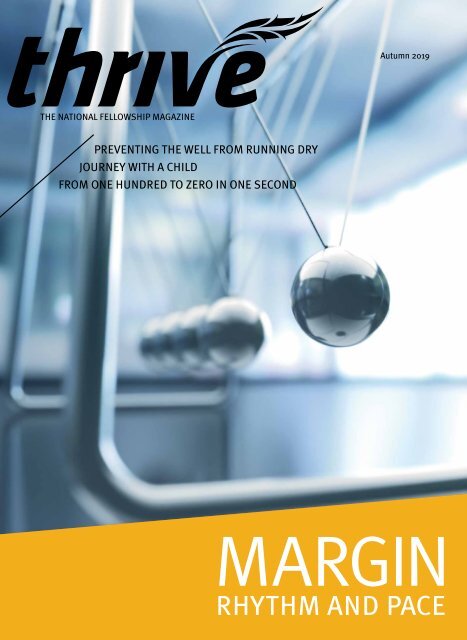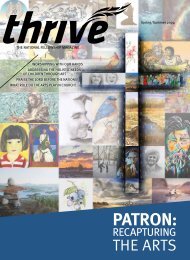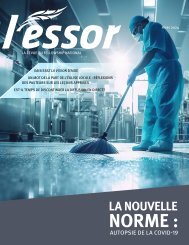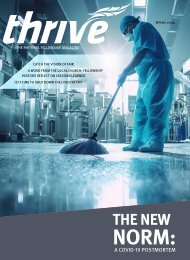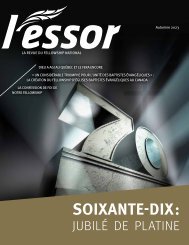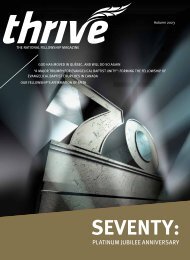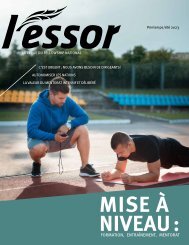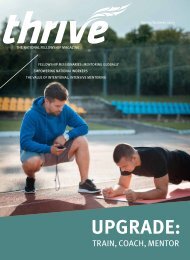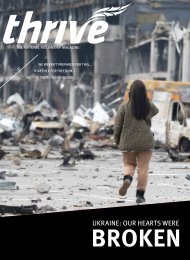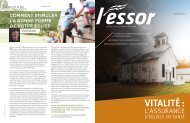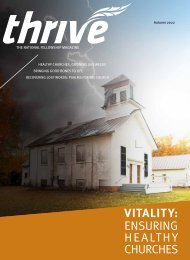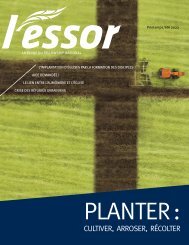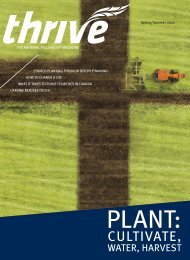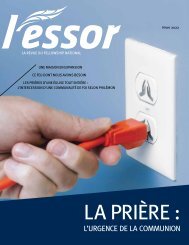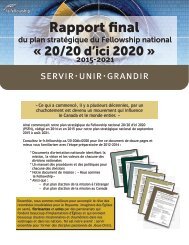Thrive_Autumn 2019 digital issue
MARGIN Rhythm and Pace
MARGIN Rhythm and Pace
- No tags were found...
Create successful ePaper yourself
Turn your PDF publications into a flip-book with our unique Google optimized e-Paper software.
<strong>Autumn</strong> <strong>2019</strong><br />
PREVENTING THE WELL FROM RUNNING DRY<br />
JOURNEY WITH A CHILD<br />
FROM ONE HUNDRED TO ZERO IN ONE SECOND<br />
MARGIN<br />
RHYTHM AND PACE
<strong>Autumn</strong> <strong>2019</strong><br />
PRAYING FOR THE<br />
SPIRITUAL<br />
CARE OF OUR<br />
SPIRITUAL LEADERS<br />
by Steve Jones<br />
When my wife and I signed the papers on our first life insurance policy, the insurance agent handed me a urine specimen<br />
bottle and asked me to fill it up. He did not hand my wife a bottle. I asked why just me? In a matter of fact way<br />
he mentioned that my wife was a nurse, and I was a pastor. I was considered “high risk”! Those were his words. I was 26<br />
years old at that time.<br />
Famed leadership guru, Peter Drucker, once said, “not taking into account the vice president’s job, the most difficult jobs in<br />
North America are: a university president, an urban hospital administrator, and a local church pastor.”<br />
THE FIRST WORD<br />
I was surprised the first time I read that a couple of decades ago. However, I do not think it is any easier today being a local<br />
church pastor. In fact, it is becoming even more complex. One well-known leader once said, “most people have no idea how<br />
difficult it is to run a church.” The local church is likely one of the most leadership-intensive enterprises in society today.<br />
The work is building and redeeming lives, an intangible process. Church leaders rarely know when an outcome has actually<br />
been accomplished.<br />
“NOT TAKING INTO ACCOUNT THE VICE PRESIDENT’S JOB, THE MOST DIFFICULT<br />
A UNIVERSITY PRESIDENT, AN URBAN HOSPITAL ADMINISTRATOR, AND A LOCAL
thrive-magazine.ca<br />
thrive / 3<br />
Church folks are all volunteers. They can simply leave when disciplined or challenged<br />
to commitment. We cannot offer monetary incentives or benefits. The best<br />
leaders can do is promise work without pay, time away from family and, if things<br />
go according to Scripture, they will know suffering as part of their reward. That’s a<br />
benefit package that likely won’t attract hundreds to service.<br />
Over 1,000 pastors will be forced to resign this month in North America. In the<br />
next decade, approximately 40% of today’s pastors will be in another line of work.<br />
I wonder if that will be true of engineers, doctors, lawyers, teachers, or other<br />
professionals. The fact is, most healthy churches are churches with long pastoral<br />
tenures. My mentor used to say that most significant and impactful change in the<br />
local church happens between years seven and ten of a pastor’s tenure. Pastors<br />
leaving every four to six years could actually be harming the church in Canada.<br />
What is the answer? I am not certain there is only one solution, but one answer is<br />
prayer.<br />
Pastors seeking out prayer partners. Church members organizing intentional<br />
prayer for their pastor(s). Why not? The Apostle Paul asked for prayer:<br />
• “Pray that I may be rescued from the unbelievers in Judea and that<br />
my service in Jerusalem may be acceptable to the saints…”<br />
Romans 15:31 (BSB)<br />
• “Pray also for me, that whenever I speak, words may be given me<br />
so that I will fearlessly make known the mystery of the gospel…”<br />
Ephesians 6:10-20 (NIV)<br />
• “And pray for us, too, that God may open a door for our message…”<br />
Colossians 4:3 (NIV)<br />
Like Moses, who leaned on Aaron and Hur, Paul needed prayer support for his<br />
enormous responsibilities. Many members in our churches need to come alongside<br />
their pastor(s) and pray fervently for them. Ministry is not a one-man show,<br />
but a team effort.<br />
In this edition of <strong>Thrive</strong>, we are investigating the many ways in which we<br />
should—and must—care for our inner spiritual lives. While this is the responsibility<br />
of every spiritual leader, we can come alongside our pastors and partner with<br />
them in prayer. The month of October is “Pastor Appreciation Month” – a great<br />
way to support your pastor is to pray!<br />
JOBS IN NORTH AMERICA ARE:<br />
CHURCH PASTOR.”<br />
Steven Jones is President of The<br />
Fellowship of Evangelical Baptist<br />
Churches in Canada. Follow Steve on<br />
Twitter @FellowshipSteve.
4 / thrive <strong>Autumn</strong> <strong>2019</strong><br />
THE FELLOWSHIP’S THEME<br />
VERSE FOR <strong>2019</strong> IS: “JESUS<br />
SAID TO THEM, ‘MY FOOD<br />
IS TO DO THE WILL OF HIM<br />
WHO SENT ME AND TO<br />
ACCOMPLISH HIS WORK’.”<br />
JOHN 4:34 (ESV)<br />
6 PREVENTING THE WELL<br />
FROM RUNNING DRY<br />
You can connect with us on FACEBOOK:<br />
www.facebook.com/FellowshipNatl,<br />
on INSTAGRAM: @FellowshipNatl,<br />
and on TWITTER: @FellowshipNatl.<br />
Come and join the conversation.<br />
2 THE FIRST WORD<br />
PRAYING FOR THE SPIRITUAL CARE OF<br />
OUR SPIRITUAL LEADERS / Steve Jones<br />
12 LOVE EXTENDED<br />
JOURNEY WITH A<br />
CHILD / Norman Nielsen<br />
truth talk<br />
5 FOUNDATION<br />
TO GIVE, OR NOT<br />
TO GIVE? / Gord Baptist<br />
6 OUT THERE<br />
PREVENTING THE WELL FROM<br />
RUNNING DRY<br />
GETTING TO THE HEART OF THE MATTER<br />
11 GROUND WORK<br />
MENTORING FOR SOUL CARE / Tim Kerr<br />
REV. P.V. PHILIPS / Pat Di-Fonzo<br />
REV. PHIL PHILIPS: A KINGDOM<br />
IMPACT / M. Williams<br />
14 TRUTH TALK<br />
THE HEALTH BENEFITS<br />
OF FAITH / Valerie Heaton<br />
REST AND REFRESH<br />
18 UP TO SPEED<br />
THE EMOTIONALLY HEALTHY CHURCH<br />
LEGACY OF HOPE: NEW CANADIAN<br />
BURSARY / Hannah Temple<br />
FROM ONE HUNDRED TO ZERO<br />
IN ONE SECOND<br />
22 THE LAST WORD<br />
SERIOUSLY, GO TO<br />
CHURCH / John Stackhouse<br />
love extended<br />
up to speed<br />
MISSION STATEMENT: <strong>Thrive</strong> is the official magazine of The Fellowship of Evangelical Baptist Churches in Canada. It is published to<br />
enhance the life and ministry of church leaders and members in Fellowship congregations by providing articles, resources and news that<br />
reflect evangelical values, a common mission as well as a shared sense of identity and vision. <strong>Thrive</strong> is published three times a year and is<br />
available in English and French.<br />
© The Fellowship of Evangelical Baptist Churches in Canada<br />
MINISTRY CENTRE: P.O. Box 457, Guelph ON N1H 6K9<br />
T: 519-821-4830 F: 519-821-9829 EMAIL: president@fellowship.ca<br />
thrive-magazine.ca<br />
SENIOR EDITOR: Steven Jones MANAGING EDITOR: Valerie Heaton COPY EDITOR: Jesskah McCartney LAYOUT & DESIGN: Ampersand<br />
EMAIL: thrive@fellowship.ca POSTAGE: Return undeliverable Canadian address to Circulation Department, P.O. Box 457, Guelph ON N1H 6K9
thrive-magazine.ca<br />
foundation<br />
TO GIVE, OR<br />
NOT TO GIVE?<br />
by Gord Baptist<br />
As the saying goes, there are two things in life that are unavoidable:<br />
death and taxes. As Advancement Director for<br />
the Fellowship Foundation, I have the privilege of helping our<br />
members plan their Estates—not only distributing their assets<br />
to their love ones, but also to ministries that help advance God’s<br />
Kingdom.<br />
As mentioned above, death creates taxation. Assets that have<br />
taxable gain upon death must be assessed and dealt with when<br />
it comes to distribution of the Estate. The one universal standard<br />
in charitable giving is that all contributions create a tax<br />
deduction, which creates tax reduction on the Estate. If there<br />
is a tax reduction, it means a greater portion is available to the<br />
family.<br />
That said, 50% of Canadians do not have a testamentary will,<br />
thereby leaving their family subject to the laws of intestate,<br />
seeing their assets distributed by provincial legislation. A will<br />
avoids that, telling your survivors and the courts how you<br />
want your Estate settled. If you do not have a will, we at the<br />
Fellowship can provide expert support,<br />
connecting you with legal counsel to help<br />
fulfill your ministry and inheritance passions.<br />
— Gord Baptist is Fellowship<br />
Advancement Director and can be reached<br />
at 519.821.4830, extension 244, fax<br />
519.821.9829, gbaptist@fellowship.ca
<strong>Autumn</strong> <strong>2019</strong><br />
PREVENTING<br />
THE WELL FROM<br />
OUT THERE: FELLOWSHIP INTERNATIONAL
thrive-magazine.ca<br />
thrive / 7<br />
RUNNING DRY<br />
SOME OF OUR MISSIONARIES SHARE HOW THEY STRIVE TO STAY<br />
CLOSE TO THE LORD IN THE MIDST OF DAILY MINISTRY DEMANDS.<br />
*Some names have been removed to maintain anonymity.<br />
Kathryn Fleming, Fellowship<br />
International missionary<br />
“You must arrange your days so that you<br />
are experiencing deep contentment, joy,<br />
and confidence in your everyday life with<br />
God.” —Dallas Willard<br />
When I was a child I was in a church<br />
club that required me to learn a lot of<br />
Bible verses. If you memorized enough<br />
Scripture you could win prizes. I liked<br />
the prizes as well as the attention.<br />
One day, after procrastinating and<br />
only having a couple of hours before<br />
the reciting, I put a verse to song.<br />
Colossians 3:16: “Let the Word of Christ<br />
dwell in you richly...” Little did I know<br />
that years later this would be one of<br />
the ways I nourished myself and my<br />
family spiritually. God speaks to me all<br />
day long through passages of Scripture<br />
that I have memorized through song.<br />
I swim regularly, and often the Holy<br />
Spirit brings passages to mind and I get<br />
to sing them while exercising. When<br />
I feel anxious and fearful the Spirit reminds<br />
me of the Lord’s presence with<br />
me and I am comforted. Sometimes<br />
I look for other ways to calm myself<br />
down but God graciously and tenderly,<br />
through His Word, brings me to back<br />
to His reality-the only true source of<br />
peace. In Japan, feelings of inadequacy<br />
and fear often grip me just before<br />
meeting people. I would like to turn<br />
around and go home, but God reminds<br />
me through my Scripture songs that<br />
He goes ahead of me and will strengthen<br />
me. “But we have this treasure in jars<br />
of clay to show that this all-surpassing<br />
power is from God and not from us.”<br />
2 Corinthians 4:7 (NIV).<br />
K., Fellowship International missionary<br />
While trying to help other people establish and maintain a growing walk with Jesus,<br />
it is easy to fall into a pattern of coming to the Word in order to teach it, rather than in<br />
order to deepen my own walk. I have done various things over the years to make sure<br />
that I was listening to the Spirit.<br />
One thing I have done is to keep a jar in which I place sticky notes of thanksgiving for<br />
what God is doing in and through me. Then, on New Year’s Eve, I take them all out and<br />
remember God’s faithfulness throughout that year. Reading through the Bible has been<br />
another way to keep the focus off of ministry and on Jesus.<br />
I have also tried to learn to obey when God<br />
reveals something new to me. I can’t expect my<br />
relationship to grow if I am not willing to put<br />
into practice the things I already know that I<br />
need to incorporate in my life.<br />
One final thing that helps me is to read<br />
Scripture in different versions of English,<br />
Spanish, and Portuguese in order to really meditate<br />
on a passage, especially when it is one that<br />
I have read often. Slowing down and hearing<br />
it in a different way often allows the Spirit to<br />
speak in fresh ways through a familiar passage.<br />
M. Wall, Fellowship International missionary<br />
SLOWING DOWN<br />
AND HEARING IT IN<br />
A DIFFERENT WAY<br />
OFTEN ALLOWS<br />
THE SPIRIT TO<br />
SPEAK IN FRESH<br />
WAYS THROUGH A<br />
FAMILIAR PASSAGE.<br />
Following Jesus allows me to navigate various cultural landscapes. Here is one thing<br />
that helps me to stay fresh: I am learning to listen. I pray as I eat, and eat as I pray. God<br />
comes to remind me in strange ways that He is with me. A little bird lands on my window<br />
sill as I contemplate God’s wonder in the quietness of the morning. My prayer is<br />
full of burden. Through the sparrow, God reminds me that He’s got my back. The burden<br />
lifts and I can move on with more lightness. As I travel cross-culturally to teach,<br />
I am usually over-prepared. But then in the midst of trying to communicate a new<br />
concept, one local leader says, “Here, take my eyes.” Seeing through the eyes of others<br />
and learning from their embodiment of what it means to follow Jesus rattles me every<br />
time, but God speaks through this. These new eyes help me to question what I have received<br />
from my previous cultural experiences. They are God’s way of keeping me fresh.<br />
I am learning to listen.
<strong>Autumn</strong> <strong>2019</strong><br />
GETTING TO<br />
THE HEART OF<br />
THE MATTER<br />
INTERVIEW WITH PHIL WEBB, FELLOWSHIP INTERNATIONAL<br />
MISSIONARY WORKING TO MENTOR PASTORS IN COLOMBIA<br />
AND CANADA IN THE AREA OF LEADERSHIP DEVELOPMENT.<br />
OUT THERE: FELLOWSHIP INTERNATIONAL<br />
What does your ministry focus on?<br />
What are the main <strong>issue</strong>s you deal with<br />
when mentoring?<br />
For the past 20 years, my ministry has<br />
focused on leadership development<br />
with pastors—not developing their<br />
professional abilities, but focusing on<br />
building their character and examining<br />
their relationship with God. A good number of pastors<br />
don’t have as intimate a relationship with God as they<br />
need to: they have plenty of head-knowledge, but it hasn’t<br />
fully taken residence in their heart. I seek to address this,<br />
helping them reach new depths in their intimacy with the<br />
Lord. Many pastors also find it hard to receive help and inpouring<br />
from others, even from God. This always leads to<br />
burnout! Receiving takes a level of vulnerability that many<br />
in society view as a weakness, yet without it our spiritual<br />
well dries up. A big contributor to this is insecurity—some<br />
leaders are insecure, and it prevents them from establishing<br />
close relationships. Without close relationships to<br />
expose our motivations, it’s easy to become distracted<br />
from acknowledging shame and fear. If no one knows us<br />
intimately enough to see the motivations behind our behaviours,<br />
this can go unchecked, which is why developing<br />
close, honest relationships is so essential.<br />
Can you walk us through the process of mentorship that happens?<br />
What sets it apart from other mentorship programs?<br />
In the early stages of my ministry, relationships were<br />
developed by proximity; those who I was already developing<br />
for ministry in Colombia were those I mentored.<br />
Since returning to Canada, I’ve been meeting with pastors<br />
who approach me for help. Meetings can be through various<br />
modes (in person, phone, skype) and can last varying<br />
lengths of time, depending on the <strong>issue</strong>s that need to be addressed.<br />
There are some men that I meet with once a week<br />
for only a few months, some meet with me once a month<br />
for four years, while there are some I meet with once every<br />
six months for many years. Some men know what <strong>issue</strong>s<br />
they want to work on before we start, and some discover<br />
new, unexpected <strong>issue</strong>s as we journey together. Many<br />
EVERYTHING DRIVES BACK TO THE QUESTIONS, “WHERE DOES<br />
AM I RESTING IN MY
thrive-magazine.ca<br />
thrive / 9<br />
IF WE CAN FIRST RESTORE THEIR RELATIONSHIP<br />
WITH THEMSELVES, ALLOWING THEM TO<br />
IDENTIFY AS BELOVED<br />
SONS OF GOD, FROM THERE<br />
OTHER RELATIONSHIPS ARE RESTORED AND<br />
BEHAVIOURS BEGIN TO CHANGE.<br />
times people will try to change the symptoms (behaviours)<br />
without tracing it back to the root. We need to deal with the<br />
heart of the matter before we can break people free from the<br />
behaviours that accompany it. Everything drives back to the<br />
questions, “Where does my identity lie? Am I resting in my<br />
identity given by God?” I try to change relationships, not behaviour—relationships<br />
with others, with self, and with God.<br />
Romans 13:8-10 tells us that every single sin is a lack of love<br />
and hurts a relationship; therefore, every change God asks of us<br />
will be a relational change. If we can first restore their relationship<br />
with themselves, allowing them to identify as beloved<br />
sons of God, from there other relationships are restored and<br />
behaviours begin to change. I’m so passionate about this topic<br />
that I wrote a book (in Spanish) about what relational theology<br />
looks like, called Connected.<br />
What are the most common barriers you face when mentoring in<br />
this way?<br />
Many times the men that I mentor are resistant to getting as<br />
emotionally close to me as necessary. Without honesty and<br />
vulnerability, the relationship can’t achieve what it needs to<br />
in order to see meaningful character refinement. It’s also very<br />
hard for people to look at their own pain and unresolved <strong>issue</strong>s.<br />
They may have been hurt in the past and feel reluctant to<br />
let someone new get close to them. Another drawback is the<br />
time-consuming nature of working in one-on-one meetings: it<br />
means that I have to pull back on programming to spend time<br />
with each individual. It also requires a lot of spiritual and emotional<br />
investment, as we tackle many difficult <strong>issue</strong>s, and there<br />
is an element of moving into unknown territory—there are no<br />
guaranteed outcomes!<br />
How have you seen God at work?<br />
Seeing God transform people when they understand their<br />
true identity as children of the Most High is easily the most<br />
rewarding transformation. In John 17:23, Jesus asks God that<br />
“the world may know that you sent me and loved them even as<br />
you loved me.” When we can grasp that fact, we’re on our way<br />
to embracing our God-given identity. I have also seen God deal<br />
with not only guilt, but shame, which is more identity-based<br />
than guilt, as it distorts a person’s perception of themselves.<br />
When shame is lifted, people experience freedom to move into<br />
areas of ministry that they were afraid of previously. I have<br />
seen many pastors finally become vulnerable, and many who<br />
overcome sexual addictions by embracing their identity as<br />
children of God.<br />
MY IDENTITY LIE?<br />
IDENTITY GIVEN BY GOD?”
ground work<br />
<strong>Autumn</strong> <strong>2019</strong><br />
MENTORING FOR<br />
SOUL CARE<br />
by Tim Kerr<br />
GROUND WORK: FRANCOPHONE AND CHAPLAINCY<br />
Mentoring pastors in Québec has been a special privilege<br />
for me. Over the years my mentoring philosophy<br />
and methodology has evolved considerably. The content<br />
has been tested repeatedly and has been greatly refined<br />
(with approximately 150+ men in one-to-one meetings that<br />
have usually continued for about two years, and about half<br />
of those men have been pastors).<br />
The underlying philosophy involves three pieces, which I<br />
envision as three interlocking circles needing Spirit-given<br />
wisdom to hold them together with the right proportion<br />
and balance.<br />
The first is the TRUTH circle. This involves Christ-centred<br />
theological truths: both beliefs and behaviours that are<br />
essential for mind-renewal and personal transformation.<br />
Mentoring by truth alone, however, is inadequate because<br />
though mentoring this way gives good direction, it tends to<br />
be impersonal. The program, rather than the true needs of<br />
the person, sets the agenda.<br />
The second circle is the LOVE circle. This involves developing<br />
relationships with others where committed accountability,<br />
friendship, and specific Spirit-directed counsel is<br />
fitted to the needs of the<br />
individual. Love without<br />
truth, however, is<br />
also inadequate because<br />
though it conveys care,<br />
it eventually stalls for<br />
lack of direction, and<br />
lacks a proper Godcentredness<br />
in the content<br />
of the meetings.<br />
The third is the POWER<br />
circle. This essential<br />
and often missing piece involves encountering the Holy<br />
Spirit’s ministry through the means of faith and prayer. Yet,<br />
if power is sought without truth and love it inevitably leads<br />
to flaky mysticism and experiences that cannot be tested<br />
by Scripture. I believe all three elements—truth, love, and<br />
power—are essential for mentoring to be truly biblical and<br />
transformative.<br />
One of the primary areas that I seek to grow in my mentees<br />
is the faith-habit of prayer. Learning to pray Scripture<br />
in intercession for others; learning to live in the good of<br />
the Gospel through prayer; praying for the power of the<br />
Holy Spirit so we will comprehend Christ’s vast love for us;<br />
learning how faith affirmations in prayer work; learning<br />
how to accept difficult things through surrendered prayer<br />
for what we don’t control, understand, or enjoy; and learning<br />
to present ourselves anew to God in prayer (Romans<br />
6:13 and 12:1). Prayer has so many aspects to it and we seek<br />
to discover as many of them as possible.<br />
In the end, both the mentor and the mentee grow together,<br />
encounter Christ together, find wisdom, encounter<br />
the Spirit, and form friendships that often last a lifetime.<br />
Mentoring is really just another aspect of pastoring…but in<br />
this case it is making sure pastors are pastored!<br />
—Tim Kerr was born in Canada,<br />
but spent almost half his life in<br />
Asia. In 2006 he planted a church in<br />
the north end of Toronto and then<br />
passed the baton of leadership in<br />
2017. He has spent 34 years mentoring<br />
pastors and businessmen with<br />
a special focus on personal spiritual<br />
renewal. Tim and Joanne have four adult children and four<br />
grandchildren.
thrive-magazine.ca<br />
thrive / 11<br />
REV. PHIL PHILIPS:<br />
A KINGDOM IMPACT<br />
PUBLISHED OCTOBER, 1980<br />
by M. Williams<br />
Toronto International Airport has an unusual service to offer<br />
its employees and passengers these days. In the midst of the<br />
comings and goings, the greetings and partings, the ebb and flow<br />
of humanity, there is a small oasis of calm, a retreat for the troubled,<br />
a resting place for the weary of heart. Yes, it’s a chapel—a<br />
chapel right in the airport.<br />
Two years ago no one thought it was possible. No one, that is,<br />
except Rev. Philip V. Philips, one of our Home Missions missionaries,<br />
and God. But after all, what is needed to get a project off<br />
the ground but a man with a burden and a God who has all the<br />
resources?<br />
In January 1978, Philip Philips took a day off to wait on the Lord<br />
for guidance in his ministry. At that time God put into his heart<br />
a burden for the airport ministry and a basic plan for witness<br />
there. In obedience to God’s call, he began knocking on the doors<br />
of officialdom. The answer was always the same: “It is impossible<br />
to allow such a mission at the airport.” Philips took his problem<br />
back to God and received his answer: “For a great door and effectual<br />
is open unto me, and there are many adversaries” (1 Corinthians 16:9).<br />
“I knew, then,” he said, “that as far as God was concerned, the door<br />
was open. So we began to go through, working one day a week in<br />
airport witness, without official permission or aid.”<br />
Since then the doors have swung open to an amazing degree.<br />
In March of 1979 the same officials who had said, “Impossible,”<br />
gave Mr. Philips sufficient space for a chapel, reception area and<br />
offices. Oh yes, God is the God of the impossible.<br />
Rev. Philips has asked two things of God this year. One is that<br />
he may see seven well established Bible study groups throughout<br />
the airport. The other is that he might have the privilege<br />
of leading 100 souls to Christ before the year closes. The seven<br />
Bible studies are now in operation with over 300 people involved.<br />
And already (at the beginning of August) 57 people,<br />
most of them employees and their family members, have come<br />
to Christ.<br />
Truly the door is open. But what of the adversaries? They are<br />
there! Satan is always present when his kingdom is being challenged.<br />
There are also the adversaries of shortness of time and<br />
lack of staff. Some Christians from Bramalea Baptist Church<br />
have been giving help in counselling and conducting services.<br />
But the ministry is growing, and the load falls more and more<br />
heavily on the shoulders of one man—Chaplain Philips.<br />
Of one thing we are sure: God stands behind this man. And<br />
God had something else to say in His Word about open doors.<br />
Revelation 4:8 says, “...behold, I have set before thee an open<br />
door, and no man can shut it…” International Ministries stands<br />
on the threshold of a great outreach for God. Philips says, “We<br />
are praying for a revival at this airport which will have far reaching<br />
effect. Please continue to pray for us.”<br />
*This article originally appeared in the Evangelical Baptist Magazine in October, 1980<br />
and has been edited and condensed.<br />
REV. P.V. PHILIPS by Pat Di-Fonzo<br />
I distinctly remember first meeting Rev. Phil Philips in 1980, as he was still establishing the Evangelical Chaplaincy<br />
Ministries at Toronto’s International Airport.<br />
Pastor Philips visited our home and pointed my wife and children to the Lord Jesus. As a visionary leader, Pastor Phil<br />
blessed many across Canada, and for twenty-seven years he impacted my life in unimaginable ways. I even had the privilege<br />
of serving under his spiritual leadership as a chaplain. He has done great things for God’s Kingdom, and many souls<br />
would not know the saving grace of Christ without his influence. Let this nostalgic article about Pastor Philips’ first years<br />
in Airport Chaplaincy ministry remind us of his Godly character and deep commitment to walking closely with the Lord,<br />
even in the face of adversity.
love extended<br />
<strong>Autumn</strong> <strong>2019</strong><br />
LOVE EXTENDED: FAIR
thrive-magazine.ca<br />
thrive / 13<br />
JOURNEY<br />
WITH A<br />
CHILD<br />
by Norman Nielsen<br />
Today’s children carry a burden laid on<br />
them by adults. “Adulting” demands that<br />
we fix what we have broken by commission,<br />
or have allowed to stay broken by omission.<br />
Worldwide there are an estimated 140 million<br />
orphaned children, deprived of one or<br />
both parents. It is also estimated that 100<br />
million children live on the streets today, vulnerable to exploitation<br />
and abuse. The United National High Commissioner for<br />
Refugees (UNHCR) reports that over half of the world’s refugees<br />
(25.4 million) are children who spend their childhood away<br />
from home and often separated from family. A joint World<br />
Bank-UNICEF study published in 2016 reports that 385 million<br />
children around the world live in extreme poverty.<br />
It’s hard to wrap our heads around these kinds of numbers. How<br />
is it possible for so many children to be denied all the things<br />
that we take for granted, considering them to be human rights?<br />
It is easy to be overwhelmed by the deep and desperate need<br />
that the numbers represent.<br />
As followers of Christ we have a compelling reason to be instruments<br />
of change, to fix what adults like us have broken or<br />
ignored. We are commanded to do so. The parables of the New<br />
Testament include a description of what the people of God’s<br />
Kingdom look like when Jesus says: “Come, you who are blessed<br />
by my Father; take your inheritance, the kingdom prepared for you<br />
since the creation of the world. For I was hungry and you gave me<br />
something to eat, I was thirsty and you gave me something to drink, I<br />
was a stranger and you invited me in. I needed clothes and you clothed<br />
me, I was sick and you looked after me, I was in prison and you came<br />
to visit me.” Matthew 25:34-36. (NIV)<br />
But what can we do to lift some of that crushing weight borne<br />
by the weakest and most vulnerable? How can we best respond<br />
to the hopelessness, and yes, accusation in the eyes of a hurting<br />
child?<br />
This fall, FAIR, in partnership with Fellowship International<br />
missionaries on-site, has launched Journey With a Child, an appeal<br />
introducing The Fellowship Child Sponsorship Program. This<br />
new program is dedicated to a holistic approach to meeting the<br />
needs of the most vulnerable in Lebanon, Honduras, and Sri<br />
Lanka. Each situation has unique features but The Fellowship<br />
Child Sponsorship Program strives to provide what is specifically<br />
needed in each location, including education, healthcare, food,<br />
and shelter over the period the child or youth is in the program.<br />
Two of the programs are residential, two are non-residential.<br />
Our top priority is the spiritual wellbeing of the children.<br />
Opportunities to share the Gospel, for discipleship, for spiritual<br />
development, and for prayer support are built in. These children<br />
have the capacity to be change-makers for Christ in their<br />
communities and around the world.<br />
In order to fully fund the four locations included in The<br />
Fellowship Child Sponsorship Program, FAIR needs 665 sponsors<br />
giving $35 monthly to support needy children in<br />
Honduras, Lebanon, and Sri Lanka.<br />
Co-sponsors, where several sponsors support one child or youth,<br />
will receive regular updates and, where possible, photos. Each<br />
program has its own fund into which individual support is<br />
pooled so that everyone within that location is benefitted equally.<br />
In addition to long-term support from sponsors, FAIR,<br />
through the Journey With a Child appeal, is seeking to raise<br />
an additional $80,000. These funds will provide for the framework<br />
that supports the program, including: bridge funding to<br />
maintain the current locations until sponsorships are in place,<br />
on-site staff expenses, and promotion of the programs.<br />
Take that journey with a child, one that will lighten the load<br />
they bear and turn their feet from a path of hopelessness to one<br />
of hope.<br />
—Norman Nielsen serves as Associate FAIR Director.<br />
IT IS ALSO ESTIMATED THAT 100 MILLION CHILDREN<br />
LIVE ON THE STREETS TODAY, VULNERABLE TO EXPLOITATION AND ABUSE.
truth talk<br />
<strong>Autumn</strong> <strong>2019</strong><br />
HEALTH<br />
THE<br />
BENEFITS<br />
by Valerie Heaton<br />
OF FAITH<br />
TRUTH TALK: THEOLOGY AND TRENDS<br />
In today’s culture, we’re constantly told that if we hustle<br />
hard enough, follow our feelings, and chase our dreams<br />
we’ll be living happy, healthy and enviable lives. There are<br />
countless self-help books, podcasts, and gurus that profess<br />
to hold the secret to being your absolute best, and many fall<br />
victim to these false claims.<br />
Not many non-Christians would think that religion could<br />
play a role in cultivating the kind of life they seek, yet<br />
numerous studies have shown that there are both mental<br />
and physical health benefits to those who regularly engage<br />
in religious practices such as prayer, reading Scripture,<br />
and attending worship services. In fact, adults who are<br />
highly religious (pray daily and attend religious services<br />
at least once a week) have been shown to volunteer more,<br />
engage more with their families, and have a higher rate of<br />
overall happiness than those who are less religious or not<br />
religious at all 1 . Going one step further, those same people<br />
were shown to have a greater sense of hope, purpose and<br />
meaning in life, and mental well-being 2 . Christians who<br />
experience deep intimacy in their walk with God can<br />
surely attest to the hope and peace it brings. In Isaiah 26:3<br />
(ESV) we read, “You keep him in perfect peace whose mind is<br />
stayed on you, because he trusts in you.” There are so many<br />
things competing for our attention: smart phones, tablets,<br />
social media, TV, Netflix, emails, missed calls… the list goes<br />
on and on. Finding peace in the midst of this chaos doesn’t<br />
come from completing our to-do lists, but in surrendering<br />
that chaos and staying our minds on the Lord. When we<br />
embrace this Heavenly peace, we are more resilient to hardship—over<br />
100 studies have shown that those who value<br />
their faith are less likely to suffer from <strong>issue</strong>s such as depression,<br />
substance abuse, suicide, and hypertension 3 .<br />
The benefits of a vibrant spiritual life don’t end there: research<br />
also shows that it can boost your immune system,<br />
keeping you healthier overall. A 1997 study conducted<br />
by Duke University discovered that adults who regularly<br />
attend religious services have healthier immune systems<br />
than their non-religious counterparts 4 . While suffering<br />
from fewer colds is certainly appealing, it was also found<br />
that a deeper spiritual life led to increased life expectancy!<br />
Greater involvement in religious practices was consistently<br />
associated with longer length of life, regardless of education,<br />
health background, race, or sex 5 . In fact, deeply religious<br />
individuals live an average of seven years longer than<br />
those who are not—a gap as great as that between nonsmokers<br />
and those who smoked a pack of cigarettes a day 6 .<br />
Many of us already avoid smoking in an effort to save our<br />
health and prolong our lives, but how many of us consider<br />
our daily devotional time to be a life-lengthening practice?<br />
These results only confirm what we have known for thousands<br />
of years: that a close relationship with God brings<br />
peace, joy, and fulfilment in life where nothing else can.<br />
— Valerie Heaton is managing editor of <strong>Thrive</strong> Magazine.
thrive-magazine.ca thrive / 15<br />
FINDING PEACE IN THE MIDST OF<br />
THIS CHAOS DOESN’T COME FROM<br />
COMPLETING OUR TO-DO LISTS, BUT<br />
IN SURRENDERING THAT CHAOS AND<br />
STAYING OUR MINDS ON THE LORD.<br />
FAMILY LIFE AND<br />
OVERALL HAPPINESS<br />
NOT HIGHLY RELIGIOUS<br />
GATHER WITH EXTENDED FAMILY<br />
AT LEAST MONTHLY<br />
30%<br />
“VERY HAPPY” WITH WAY<br />
THINGS ARE GOING IN LIFE<br />
29%<br />
40%<br />
47%<br />
“VERY SATISFIED”<br />
WITH FAMILY LIFE<br />
HIGHLY RELIGIOUS<br />
67%<br />
74%<br />
1<br />
Pew Research Center. (2016, 04 12).<br />
Pew Research Center. Retrieved from<br />
Religion in Everyday Life: http://assets.pewresearch.org/wp-content/<br />
uploads/sites/11/2016/04/Religion-in-<br />
Everyday-Life-FINAL.pdf<br />
2<br />
Byron R. Johnson, R. B. (2002,<br />
1 1). Objective Hope—Assessing<br />
the Effectiveness of Faith-Based<br />
Organizations: A Review of the<br />
Literature. Retrieved from Manhattan<br />
Institute for Policy Research: https://<br />
media4.manhattan-institute.org/pdf/<br />
crrucs_objective_hope.pdf<br />
3<br />
ibid<br />
4<br />
Koenig HG, C. H. (1997). Attendance<br />
at religious services, interleukin-6,<br />
and other biological parameters of<br />
immune function in older adults.<br />
International Journal of Psychiatry<br />
in Medicine, 233-50. Retrieved from<br />
https://www.ncbi.nlm.nih.gov/<br />
pubmed/9565726<br />
5<br />
Byron R. Johnson, R. B. (2002, 1 1)<br />
(n 2)<br />
6<br />
Marripedia. (2017, 09 01). Effects of<br />
Religious Practice on Health. Retrieved<br />
from Marripedia: http://marripedia.<br />
org/effects_of_religious_practice_<br />
on_health
16 / thrive <strong>Autumn</strong> <strong>2019</strong><br />
REST<br />
AND<br />
REFRESH<br />
THREE FELLOWSHIP PASTORS SHED LIGHT<br />
ON THE IMPORTANT BENEFITS OF SABBATICALS.<br />
Steve Adams, Pastor, Forward Church, Cambridge, ON<br />
TRUTH TALK: THEOLOGY AND TRENDS<br />
Sabbaticals are not just a time to refresh but a time to recalibrate.<br />
I found two steps were important for me when I did<br />
this. The first was to assess my capacity and to see if I was<br />
exceeding my band-width. I enjoy being challenged, but<br />
realize that at times I was exceeding my capacity. When I<br />
considered my ministry in aggregate it was not sustainable<br />
in the long run.<br />
Secondly, this caused me to consider two rudimentary<br />
questions: moving forward, what must I do, and secondly,<br />
what must I not do? The “what must I do” items were the<br />
contributions to the church that I was uniquely gifted in<br />
and impassioned to offer. For the senior leader these tend<br />
to be small in number but large in impact. The “what<br />
must I not do” were the contributions that another could<br />
make, often out of a greater gifting in that area of ministry.<br />
In some cases this is paid staff and in others, committed<br />
church members. In this same category, I realized<br />
there were some tasks that were detractors and not really<br />
contributors to our evolving mission, and hence no one<br />
should be doing them. This was a<br />
win and felt very freeing. Most of<br />
us have the faculty to do this but<br />
the tyranny of the urgent does not<br />
allow the expanse needed to see<br />
these items definitively. A sabbatical<br />
should not be rest that “buys us<br />
more ministry time”, but a careful<br />
exercise in ascertaining our longterm<br />
ministry capacity.
thrive-magazine.ca<br />
thrive / 17<br />
David Horita, Regional Director of Fellowship Pacific<br />
Sabbaticals are awesome, but<br />
you have to know what they are<br />
for and ensure they achieve that<br />
result. While all sabbaticals tend<br />
to follow policy guidelines, those<br />
guidelines should be sufficiently<br />
broad to make sure you get the<br />
outcome the sabbatical was designed<br />
for.<br />
My first sabbatical was intended to provide relief from the<br />
stress of concurrent ministry and academic demands. It allowed<br />
me to complete my Doctor of Ministry degree, which<br />
was primarily focused on creating a hands-on leadership<br />
development program for the church. By having a dedicated<br />
three months to complete the program, the church was<br />
also able to have a defined leadership program in place for<br />
the September start of the ministry year.<br />
The second sabbatical was 10 years later and had a different<br />
focus. This sabbatical was simply designed to give a break<br />
from the people and leadership push of our Regional office.<br />
As such, the goal was to be completely clear of ministry demands<br />
and processes. The “activity” of this sabbatical was<br />
digging, filling, and placing a backyard patio without any<br />
power tools or machines. It provided an opportunity for<br />
physical work that was nothing like my normal job. I was<br />
happy to go back to the office once the sabbatical was done!<br />
Jeff Germo, Lead Pastor,<br />
Campbell River Baptist Church,<br />
Campbell River, BC<br />
I didn’t take a sabbatical to further<br />
my education or to prevent burn<br />
out. I took my sabbatical because<br />
I was already burned out. I was at<br />
the place in my ministry where,<br />
if I didn’t do something different,<br />
my time in ministry would be cut short.<br />
A couple of things led to my burnout. One was that the<br />
church had gone through five years of very intense<br />
culture shift. I won’t dwell on that one because if it<br />
weren’t for the second reason, I probably could have<br />
handled the pressures of ministry better. The prime<br />
reason I burned out was because I am a recovering<br />
performance addict. It really came down to the fact<br />
that I didn’t trust God enough to stop and rest.<br />
It was my staff who lovingly but firmly faced me<br />
with the fact that I needed to take a sabbatical.<br />
They saw the signs. I gave them permission to<br />
contact Dale, our board chair, who immediately<br />
met with each of them, and with my wife<br />
Ruthie and me, to come up with a sabbatical<br />
plan. The first step was a retreat at Oasis<br />
Leadership Ministries, complete with three<br />
days of intensive counselling to get to the<br />
root cause of my burnout.<br />
The total time we took off was ten weeks.<br />
We stayed almost completely disconnected<br />
from the church and practiced<br />
trusting God. That is my big lesson. I<br />
need to practice what I preach—that<br />
God is God and I am not, and I can<br />
trust Him.<br />
CLERGY<br />
CARE<br />
1∙888∙5∙CLERGY<br />
Focus on the Family provides an important and meaningful<br />
service to those in pastoral ministry — their Clergy<br />
Care hotline. Pastors and their families can call toll-free<br />
and speak with professionally-trained counsellors who<br />
help them deal with their struggles, all with the reassurance<br />
that Clergy Care ensures strict confidentiality. If you or<br />
someone you know in pastoral ministry is in need of help (or<br />
even just a listening ear), don’t hesitate to use this wonderful<br />
ministry! Call their toll-free number today: 1-888-5-CLERGY.
<strong>Autumn</strong> <strong>2019</strong><br />
THE EMOTIONALLY<br />
HEALTHY CHURCH<br />
Interview with James Bekkers, Executive Pastor, Donald Calder,<br />
Lead Pastor of Temple Baptist Church, Sarnia, and EHD Point Leaders<br />
Don and Nancy Dafoe, Temple Baptist Church in Sarnia, ON<br />
When did Temple Baptist adopt the Emotionally Healthy Discipleship model? What were the<br />
reasons that you as a church decided to pursue it?<br />
UP TO SPEED: REGIONAL UPDATES<br />
In 2017, God called Donald Calder to serve as our new lead pastor, arriving at a critical<br />
time when we were considering a new ministry plan to accompany what is now our<br />
mission statement: “Connecting people to jesus and to one another”. We had many<br />
programs but no clear strategy to move people<br />
from being seekers to practicing, mature followers<br />
“THROUGH THIS COURSE<br />
of Jesus. Don Dafoe had read Peter Scazzero’s book,<br />
Emotionally Healthy Spirituality, and the honesty I REALIZED THROUGH<br />
and transparency of his testimony spoke to us. It HIM I CAN OVERCOME<br />
touched on areas where we wanted our discipleship<br />
to go beyond the acquisition of information<br />
MY WALLS, BREAK<br />
and move to life transformation.<br />
THROUGH BARRIERS,<br />
What do participants learn through the Emotionally<br />
Healthy Discipleship program?<br />
We get consumed by activity in the Christian life<br />
but don’t take the necessary time to sit at Jesus’<br />
feet and develop a deeper relationship with Him.<br />
Emotionally Healthy Discipleship provides a new<br />
way of living in deeper relationship with Jesus.<br />
Many Christians still have baggage due to their<br />
upbringing, hurts, and broken relationships. They<br />
AND LISTEN IN SILENCE<br />
TO HEAR WHAT GOD<br />
IS SAYING TO ME; THAT<br />
I CAN HAVE FREEDOM<br />
BY LETTING GO OF MY<br />
PAIN AND LIVE AS GOD<br />
INTENDED ME TO LIVE.”<br />
—COURSE PARTICIPANT
thrive-magazine.ca<br />
thrive / 19<br />
“I BEGAN TO REALIZE HOW<br />
MUCH I HAVE BEEN MISS-<br />
ING OUT OF MY WALK WITH<br />
CHRIST. I KNEW SOMETHING<br />
WASN’T RIGHT IN MY SPIRI-<br />
TUAL LIFE BUT DIDN’T KNOW<br />
WHAT IT WAS OR HOW TO<br />
FIX IT. I GOT TO KNOW MORE<br />
ABOUT MYSELF, WHICH<br />
HELPED ME EXPERIENCE A<br />
CLOSER INTIMATE RELATION-<br />
SHIP WITH GOD.”<br />
—COURSE PARTICIPANT<br />
need the tools to understand themselves and their baggage before they can truly develop<br />
a deep, loving relationship with God and deeper relationships with others. The<br />
Emotionally Healthy Discipleship program provides the means to accomplish this.<br />
How did you go about bringing this model into your church? What were the biggest changes<br />
you saw throughout the process?<br />
This model was introduced to our Elders by Don as then chair of Elders during the 18<br />
months our church was without a pastor prior to Pastor Donald’s arrival. We participated<br />
in a webinar with Peter Scazzero walking us through some of the material,<br />
after which we agreed to host a trial run of the Emotionally Healthy Spirituality course<br />
for leaders and key ministry personnel. We soon realized this course had real wisdom<br />
and would be an opportunity to encourage deep personal and spiritual growth<br />
within our congregation. So with a green light to proceed, we opened it up to the rest<br />
of our church. Many participants saw immense spiritual growth from the process, and<br />
changed relationships with each other and with Jesus. Marriages were strengthened,<br />
prayer lives were deepened, and people were abiding in Christ like never before.<br />
“THIS IS THE MOST HELPFUL DISCIPLESHIP MATERIAL WE HAVE<br />
EXPLORED IN YEARS. IF YOUR CHURCH IS LOOKING FOR SOME-<br />
THING TO HELP YOUR PEOPLE GROW SPIRITUALLY, I WOULD DEFI-<br />
NITELY RECOMMEND YOU GIVE THIS A TRY.”<br />
—JAMES BEKKERS, EXECUTIVE PASTOR<br />
LEGACY OF HOPE:<br />
CENTRAL BAPTIST CHURCH,<br />
VICTORIA, BC by Hannah Temple<br />
In 1980, there was a global crisis not unlike the Syrian crisis today. Central<br />
Baptist Church in Victoria, BC responded by sponsoring two refugee-related<br />
families, the first of which was Tom and Jean Truong with their six children.<br />
The Truong family were part of the one million people who fled after the<br />
Vietnam War. They encountered countless obstacles on their journey, and<br />
were eventually separated by Malaysian officials. On May 11, 1980, Tom<br />
Truong was reunited with his wife Jean and six children in Victoria, BC after<br />
being separated for 10 months during their escape. Tom became the first custodian at Central Baptist,<br />
where he still serves today.<br />
In order to honor the legacy of Central Baptist and their sponsors, Hannah, Tom’s daughter, has created<br />
the New Canadian Bursary. Through numerous churches, friends, and family members, $50,000 has been<br />
secured to be used for an annual bursary at Ambrose University (Calgary, AB). In this way, the legacy of<br />
hope that the Truong family experienced through Central Baptist Church can live on.
20 / thrive <strong>Autumn</strong> <strong>2019</strong><br />
FROM<br />
ONE HUNDRED<br />
TO ZERO<br />
IN ONE SECOND<br />
UP TO SPEED: REGIONAL UPDATES<br />
Marilyn Jones, wife to Fellowship President Steve Jones<br />
In October 2014, I fell on a cobblestone road in Greece, injuring my leg, ankle, and back. I soon realized it was not a simple<br />
fix—it would be a life-altering trauma. The first hurdle I was to face was PAIN, which would define my life from then on.<br />
I was forced to allow others to care for me as I lay in a hospital, when I struggled to navigate in a wheelchair, and when I<br />
finally accepted that I must use a cane to walk.<br />
A friend gave me a book entitled, A Place of Healing: If God can heal me, why won’t He? I took one look at it, thanked her, and<br />
put it aside. It took me two weeks to open it. Every word she shared was a mirror of my life… feelings of helplessness, anger,<br />
pride, and most of all, grief. Grief over the loss of my previous life: my independent nature, my<br />
career as a critical care nurse, my passion to help and care for others, and alterations in my relationships<br />
with family and friends. Grief that after four surgeries, painful treatments, and medications, I<br />
would suffer from chronic pain.<br />
I have good days when I can thank the Lord for my journey and all those that have helped me<br />
along the way, from the skilled surgeons who repaired my leg and gave me a titanium ankle, to my<br />
husband Steve, who has had to adjust to the changes my injury has brought. This is not the life I<br />
pictured for myself but a new, redefined life that is constantly forcing me to rely on the Lord for<br />
strength to endure pain, grace to accept this new life, and thankfulness for those He has put in my<br />
life to walk alongside me on this journey.
thrive-magazine.ca<br />
thrive / 21<br />
GOD’S TIMING WAS EVERYTHING<br />
IN THE WAY THINGS WORKED OUT.<br />
David Dobson, former<br />
Fellowship French<br />
Mission Director<br />
In April 2014 I was serving as<br />
Director of the Fellowship French<br />
Mission and as a member of our<br />
Fellowship’s Senior Ministry<br />
Team... then it hit. It started with<br />
headaches that became progressively<br />
worse, and by the week of Easter I was admitted to the<br />
hospital in St. Eustache, QC. Several days later I slipped into<br />
a coma, from which I emerged on Easter Sunday morning.<br />
During my 10 weeks of hospitalization it was determined that<br />
I had been stricken down with tuberculosis meningitis. After<br />
an additional five weeks in rehab, I was discharged in midsummer<br />
but couldn’t even write my own name and was living<br />
with low-grade pain on my right side. Now five years later<br />
the healing process is still ongoing, but I am able to carry on a<br />
relatively active lifestyle for a senior—praise the Lord!<br />
What have I learned from this health crisis? So much! I have<br />
learned that we are all very fragile beings, and we are just a<br />
step from eternity. I’ve also learned that God chastens us because<br />
He loves us, and that Romans 8:28 is not a verse to ever<br />
be quoted glibly, but rather it has been absolutely tested,<br />
tried and found to be so true in my life.<br />
Carol Stewart, former<br />
member of Fellowship<br />
National Council<br />
A year ago, I was sidelined when<br />
a semi-truck trailer rolled over<br />
on my car. I spent fifteen weeks<br />
in hospital recovering mostly<br />
from broken bones. Six months<br />
later, follow-up surgery on my<br />
left leg kept me in a wheelchair for another three months.<br />
Rehab therapy has been extensive. Although not fully<br />
recovered, I am a walking miracle! The love and help of so<br />
many have been amazing. Through all this I am reminded<br />
that our faith may be small, but God’s faithfulness is great<br />
(Lamentations 3:21-23). Amid suffering and daily challenges,<br />
Christ’s peace and presence, through the power of the<br />
Holy Spirit, is our strength (John 16:33).<br />
Andrew Plumridge, Fellowship<br />
Chaplain<br />
I suffered a cardiac arrest on April 12,<br />
2018 at the Boys and Girls Club of<br />
London. A week later, I had quadruple<br />
by-pass surgery. Now I walk around<br />
with a few scars, an I.C.D. implant, and<br />
a few medications on board, yet I feel<br />
great and I’m ministering again as a<br />
Baptist pastor. God’s timing was everything in the way things<br />
worked out: being in the change room just before a swim in<br />
the pool that had two well-trained lifeguards and only minutes<br />
away from the paramedics, and being attended to by the<br />
Emergency staff at University Hospital. If it had happened anywhere<br />
else, I would be in Glory. God is not finished with me yet.<br />
As I became more aware of this through my recovery via my<br />
wife’s journal and what others told me, I was encouraged that<br />
God’s purpose was at work.<br />
Suzanne Rozalowsky, former<br />
FAIR Administrative Assistant<br />
I had just “celebrated” New Year’s<br />
Eve with my husband, Andrew. He<br />
was sedated and connected to many<br />
machines which were keeping all his<br />
organs working. He was alive that day,<br />
but with no real hope for his survival<br />
from aggressive leukaemia apart from<br />
a miraculous intervention by God. Hundreds of believers across<br />
Canada were praying for him, for me, and my two young boys<br />
(three years and eight months). Andrew died six days later.<br />
There were many hard days. I knew that I needed abnormal<br />
strength to tend to the daily tasks of being a single parent.<br />
I knew that I had to rely on God to get through each day.<br />
Sometimes I surrendered to God out of trust and faith and<br />
gained relief, and sometimes I surrendered because, well, where<br />
else could I go? (John 6:68)<br />
I could never have imagined surviving this type of loss. I could<br />
never have imagined that I would still be praising God and<br />
gradually, over time, thriving again. But God’s grace is sufficient.<br />
His kindness is generous. His comfort is palpable. I did<br />
believe that He was good and when I didn’t, He helped in my<br />
unbelief (Mark 9:24). Death is awful, grief is painful, but God is<br />
with me. I have tasted and seen that the Lord is good, and happy<br />
are those who trust in Him.
<strong>Autumn</strong> <strong>2019</strong><br />
SERIOUSLY,<br />
GO TO CHURCH<br />
by John Stackhouse<br />
THE LAST WORD<br />
Church wakes us from our busy routines and says,<br />
“Don’t forget!” Everybody in our extended family were<br />
faithful churchgoers. Or so I thought, until one of my<br />
uncles declared to my ten-year-old self, “I can worship God<br />
just as well on the golf course as I can in church.”<br />
Hmm. I supposed that made sense. However, when I was 12<br />
I had a question for him the next time he made that case.<br />
“Okay then, Uncle,” I looked up and asked him, “do you<br />
worship God there?”<br />
The late sociologist Kurt Bowen, in a book that deserves<br />
more attention, looked at various sociological measures of<br />
religious commitment and concluded something quietly<br />
startling about religion. “Attendance and commitment have<br />
such a high degree of overlap or similarity” that the former<br />
can serve as a reliable indicator of the latter (Christians in a<br />
Secular World, McGill-Queen’s, 2004).<br />
Those who have the “habit” of skipping church are, by<br />
all accounts, on their way out – out of church and out of<br />
Christian faith in any robust sense.<br />
Bowen isn’t taking a shortcut here, given that church attendance<br />
is relatively easy to track compared to other<br />
behaviours such as regular Bible reading and prayer, which<br />
normally can be studied only through the more dubious<br />
means of people’s self-reporting.<br />
No, church attendance correlates highly with other observable<br />
behaviours such as volunteering and charitable giving.<br />
It also coincides remarkably with orthodox beliefs and traditional<br />
Christian values such as the importance of forgiveness<br />
and concern for others, even strangers.<br />
Is somebody a serious Christian? Then she (statistically<br />
almost always) goes to church. Weekly at least. And the reverse<br />
is also true. People do not, in fact, worship God on the<br />
golf course as well as they do in church.<br />
Going to church regularly exposes us to the messages we<br />
need to hear regularly, messages different from the messages<br />
we get from advertising, politicians, entertainment<br />
media, even from well-meaning friends. It’s not that everything<br />
they say is wrong. It’s that the good things they say<br />
are mixed in with empty words, wrong words and even<br />
some poisonous ones.<br />
Church wakes us from the confused dimness of our busy<br />
routines and says, “Don’t forget! Don’t forget God, and<br />
salvation, and the love of Jesus, and the companionship of<br />
the Holy Spirit and the world to come! Don’t forget that the<br />
Bible is divine revelation, and prayer is your lifeline, and<br />
repentance must be daily, and forgiveness and power are<br />
yours for the asking! Wake up! And stay awake!”<br />
The New Testament never commands us to go to church. In<br />
fact it assumes we are there. Much of it is in the form of letters<br />
to churches, the reading of which would be done only<br />
in churches. That’s why there is only that brief warning in<br />
Hebrews 10:25 about “not giving up meeting together, as<br />
some are in the habit of doing.”<br />
No, merely going to church doesn’t make you a Christian.<br />
But going to church keeps you a Christian, and it is God’s<br />
main way of helping you mature as a Christian.<br />
Golf courses? Or hockey rinks? Or soccer fields? Or ski<br />
hills? Or cottages? Or brunches? Not so much.<br />
(Reprinted with permission and condensed for publication.<br />
Originally published in Faith Today, 29 August 2018 , Jul/Aug<br />
2018. www.faithtoday.ca.)<br />
— John Stackhouse teaches at Crandall University in<br />
Moncton, NB His latest book is Why You’re Here: Ethics<br />
for the Real World (Oxford, 2017). Find more at<br />
www.FaithToday.ca/ChristAndCulture.
DON'T IGNORE<br />
THESE WARNINGS<br />
<strong>Autumn</strong> <strong>2019</strong><br />
When there’s something wrong with your<br />
car, you take steps to fix it. Your insurance<br />
is no different. Don’t wait! Make a service<br />
call to Deeks to tune up your insurance so<br />
we can help save you money.<br />
CALL US TODAY FOR A<br />
NO-OBLIGATION QUOTE<br />
1-800-240-5283 | deeksinsurance.ca


